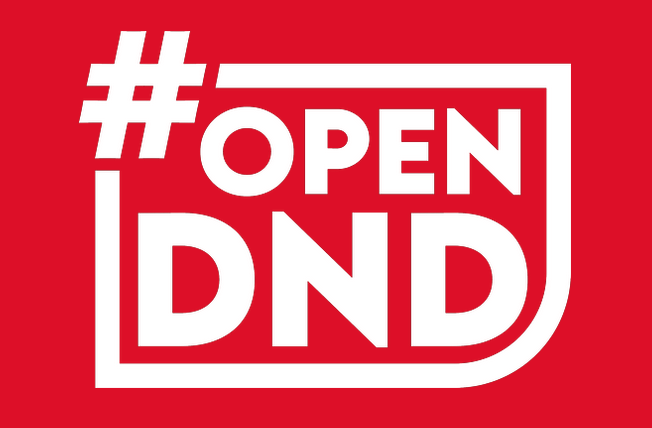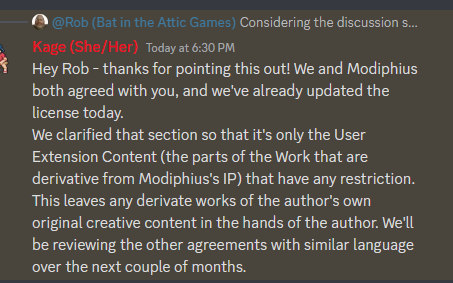A lot has been going on
- Wizards tried to have a live stream and it melted down amid incendiary rage.
- Apparently the age of ORC has arrived and this time they are the good guys as Pazio, Kobold Press, and others spearhead an effort to create a community owned open license.
- Somebody may have gotten a peek at Wizards of the Coast's character sheet and it turns out they really turned Chaotic Evil.
- Another person may have gotten a copy of their new spellbook with OGL 2.0 in it (not 1.1 apparently)
- Matt Finch gave a good on-line talk on youtube about the future of Swords and Wizardry. I even got to help solve a minor technical issue with the livestream (half of my day job is technical support).
Next a couple of things from my neck of the wood.
A Network of One
Over on the Roll for Combat channel they had an excellent interview with Ryan Dancey. I recommend jumping to around the 18:00 minute mark where Ryan says this
one of the things we identified as a problem was that there were all kinds of game systems that were active in the market that weren't very successful and every one of those games was a little bubble a little social network of people that played that game and because they were playing a game that was small and unprofitable and the companies that were supporting those games were not able to make those businesses get bigger the sizes of those bubbles were shrinking and getting smaller and smaller and smaller and because they were not well connected to other bubbles the overall Market as a whole was shrinking and getting smaller and smaller and role-playing games are fair to a very unusual economic phenomenon called in the network externality which means that the value of the thing you sell the product is actually external to the thing that you sell it's in the network of people that use that thing
The value of the OSR is in the fact that the classic editions we focus on are but a hop and a skip from each other. So while ADnD, B/X, ODnD, etc. all had their fans, our "network" was much larger as we can freely share useful material with each other.
And because most of us used the OGL 1.0a those of us who focused on sharing and publishing could build off of each other work. I didn't have to start my own Majestic Fantasy RPG from scratch as Matt Finch graciously shared Swords and Wizardry for all to use under the OGL. Plus Autarch shared a lot of ACKS as open content which helped me with started with the mechanics of worldbuilding my Majestic Fantasy Realms.
And because most of us used the OGL 1.0a those of us who focused on sharing and publishing could build off of each other work. I didn't have to start my own Majestic Fantasy RPG from scratch as Matt Finch graciously shared Swords and Wizardry for all to use under the OGL. Plus Autarch shared a lot of ACKS as open content which helped me with started with the mechanics of worldbuilding my Majestic Fantasy Realms.
The Post OGL World
In the coming days, I think it is important to carefully consider what licenses we adopt for our current and future works. Regardless of the outcome of the situation with Wizards we can never trust their word again. If too many of us pick too many licenses then we lose the advantages of the fact that classic edition clones were all under the same license. Our network will fragment and I fear the OSR as a whole will shrink, and reduce the number of players of these excellent editions.
I am a computer programmer and have been involved in software development since the late 80s. I saw the rise of open source and participated in it in a small way. And the open source licensing situation is a sea of compatible and incompatible licenses. Just read the Wikipedia article to see how much of a mess it is. I don't want to see people in the OSR having to use a chart like below just to see if they can build and remix someone's content.
In the coming days, I think it is important to carefully consider what licenses we adopt for our current and future works. Regardless of the outcome of the situation with Wizards we can never trust their word again. If too many of us pick too many licenses then we lose the advantages of the fact that classic edition clones were all under the same license. Our network will fragment and I fear the OSR as a whole will shrink, and reduce the number of players of these excellent editions.
I am a computer programmer and have been involved in software development since the late 80s. I saw the rise of open source and participated in it in a small way. And the open source licensing situation is a sea of compatible and incompatible licenses. Just read the Wikipedia article to see how much of a mess it is. I don't want to see people in the OSR having to use a chart like below just to see if they can build and remix someone's content.
Maybe Paizo's ORC is the answer maybe it isn't. We should think about what we want before we split into an archipelago of hundreds of islands.
I admit it won't be easy because the vast majority of us, including myself, like to march to the beat of our own drummer. Many early OSR community efforts collapsed into arguments and factions. But I think it is important that we try to do something together for this particular issue.
The result doesn't have to be a one size fit all solution. See Creative Common for how a standard system of options can be worked out. Keep in mind that some of us, while small, work with licensed content that will not be opened. OGL with the distinction between product identity and open content was great for that.
Three Little Words
On a different topic, I am pleased to say that a situation regarding the Community Content Programs that OnebookShelf runs on DriveThruRPG appears to have been resolved. I first reported this back in January of 2018.
To summarize in Section 4 of the license that the OBS boilerplate used stated.
Except for short promotional excerpts used to promote your Work, you may not display, recreate, publish, distribute, or sell your Work (or derivatives thereof) outside of the Program administered on Roll20 websites or through other platforms or channels authorized or offered by the Publisher.
The three bolded words meant if I wrote Tower of the Dark Sage for the Glorantha setting used by Chaosium's Jonstown Compendium, I couldn't turn around and adapt my original IP (characters, maps, room descriptions) and released it under the OGL for Swords and Wizardry. Or for another CCP program like the Savage Worlds Adventurer Guild using Savage Worlds system. This was confirmed by OBS \in this blog post.
Over the years I kept complaining to OBS and got nowhere. I had better luck with some of the programs themselves. I helped the Genesys community get the clause removed from the Genesys Foundry. But to be clear their community did most of the work.
I talked to Daniel Fox of Zweihander and the folks at Hero Games about Hall of Champions. While both didn't change their license, they did let the contributors know they were free to adapt their original IP elsewhere. So I count those as partial wins.
An Appreciated Victory
So two days ago, I heard that Modiphus was starting up their 2d20 Community Content program. As I usually do I contacted Modiphus privately and laid out my argument about getting rid of those three words. With OBS because I got nowhere before, I called them out publicly and politely on their discord server.
And guess what thanks to the work of Chris Birch on the behalf of Modiphus and Kage on the behalf of OBS, the Modiphus license, and the OBS boilerplate are being changed! And OBS is going to work with other publishers to change their licenses.
This going to be great news for all the CCPs that remove this clause. This means contributors who are fans of multiple systems can adapt their original IP for other CCPs. Thus they benefit from the Network Externalities effect that Ryan Dancey talked about. They cease to be isolated islands doomed to rise and fall on their own.
To be clear the 50% royalties is still in place (30% to OBS and 20% to the publisher), and the work for that specific program still can only be released within that program. Also, Chris wanted everybody to know that Modiphus 20% is going into buying art and assets for all to use in the 2d20 World Builders program.
We still have the bigger problem of the OGL 1.1 and Wizards of the Coast to deal with. But this is a small victory we can enjoy. It is a good example of what can happen when a bunch of folks with good intentions can get together to hash out a solution to a problem.
Fight On!
Fight On!




1 comment:
What a year it's been in the world of RPGs! And we're not even half way through January.
Thanks for your reporting and pushback against the unfair boilerplate text.
Fight on indeed!
Post a Comment